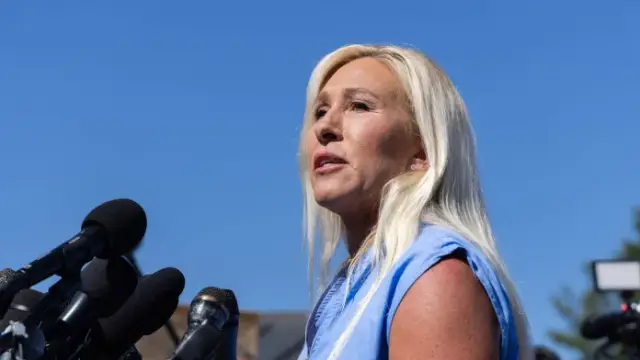A small group of Republicans is voicing opposition to a short-term spending agreement that could be brought to the House floor this week, increasing the likelihood of a government shutdown as GOP leadership navigates narrow margins.
Currently, three Republicans have publicly opposed a continuing resolution anticipated to last until the end of November. This presents a challenge for House GOP leaders who aim to advance legislation before the September 30 deadline.
Representatives Marjorie Taylor Greene (R-GA), Warren Davidson (R-OH), and Victoria Spartz (R-IN) have indicated they will not back the continuing resolution, arguing it perpetuates Biden-era spending levels while Congress works on the fiscal 2026 budget.
On Monday, Greene posted on X, stating there have been no discussions among rank-and-file Republicans regarding the continuing resolution. She wrote, “We have had zero meetings about voting on a CR. Zero. We have zero bill text. We knew it was coming for a long time, but Johnson continued the charade of passing our own appropriations.” Greene further emphasized, “It is an extension of the Johnson/Schumer/Biden omnibus that I, and many of my conservative colleagues, originally voted NO on. Congress should not pass a CR and hand our elected legislative power over to unelected OMB. That’s not how this works.”
Davidson expressed his disapproval of another stopgap spending deal, insisting he will only support a “smaller, more accountable, more focused America First government.” He added, “Lord willing, there will be a revival and resurgent faith in Jesus. Pray for it! Work for it! But, I’m not sure the GOP, the Republicans, MAGA, conservatives, or some other blend of right of center politics will do anything different.”
Spartz also announced her opposition to a potential Thanksgiving continuing resolution, stating, “I am willing to vote for a CR of any duration — short or long — the least damage to the Republic, but I cannot support one that ends funding right before a major holiday to jam us with an Omnibus.” She has previously indicated she would oppose continuing resolutions but often voted for them ultimately.
Rep. Thomas Massie (R-KY), traditionally opposed to continuing resolutions, was the only vote against the March spending deal, expressing his reluctance to support any bill maintaining flat government funding levels. “Well, I didn’t vote for the last CR, so I’m probably not going to vote for this one,” he stated in July.
With Rep. James Walkinshaw (D-VA) joining the House Democratic caucus, Speaker Mike Johnson (R-LA) can only afford to lose two GOP votes to pass a spending deal along party lines. Johnson is unlikely to receive support from Democrats, who are seeking healthcare concessions from GOP leaders.
Democrats, along with some centrist Republicans, have called for a continuing resolution that includes an extension of the Obamacare health premiums, which are set to expire at the end of the year. However, GOP leaders have shown little interest in extending the Affordable Care Act subsidies. Johnson mentioned on Sunday that Congress might require a short-term funding measure to facilitate ongoing bipartisan negotiations, stating, “But it will be clean in its scope. I surely hope the Democrats will not try to make this a big, partisan fight.”
https://x.com/RepSpartz/status/1967322787447820496
https://x.com/repmtg/status/1967568593127657637?s=46
 Telegram is where we really talk. Don't miss out!
Telegram is where we really talk. Don't miss out!








